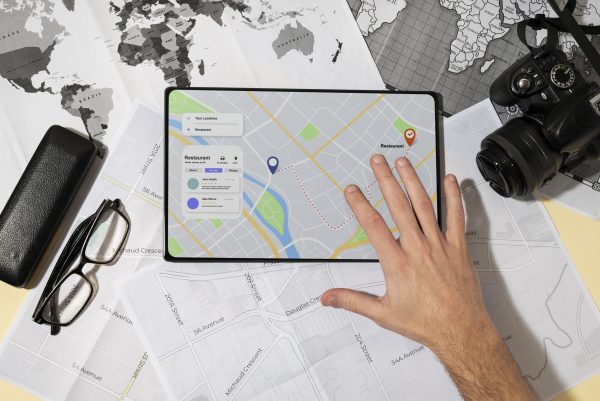The Impact of Fleet Tracker GPS on Accident Reduction
Fleet safety stands as a crucial concern that directly affects both operational efficiency and the well-being of drivers and the public. Businesses that disregard the importance of adhering to fleet safety regulations expose themselves to substantial financial, legal, and reputation-related repercussions. In this context, Fleet Tracker GPS systems have assumed a paramount role.
Citing a report by the Occupational Safety and Health Administration, the financial toll of a fleet vehicle accident can range from $16,500 to $500,000 for a business, contingent on the extent of injuries and property damage. Collectively, motor vehicle collisions result in a staggering $60 billion annual burden on employers, encompassing lost productivity, medical expenses, property harm, and legal outlays.
The implications of accidents involving fleet vehicles go beyond mere financial setbacks, extending to brand reputation, legal liabilities, and, most importantly, human lives. As such, the integration of advanced technologies has emerged as a pivotal strategy for reducing accidents and promoting overall road safety.
Fleet tracker GPS technology offers a comprehensive solution to the challenges of fleet management and safety enhancement. By providing real-time insights into vehicle locations, routes, and driver behaviors, Fleet Tracker GPS has the potential to revolutionize the way fleets are managed, monitored, and optimized for safety.
In this article, we delve into the transformative impact of Fleet Tracker GPS systems on accident reduction within fleet operations, highlighting their features, benefits, and implications for businesses and road safety.
Real-time Monitoring for Preventive Measures
One of the cornerstones of Fleet Tracker GPS systems is their ability to offer real-time vehicle tracking. With these systems in place, fleet managers gain an unprecedented level of visibility into their vehicles’ exact locations and movements at any given moment. This real-time monitoring goes beyond the traditional approach of retrospective analysis; it empowers fleet managers to proactively respond to potential safety risks before they escalate into accidents.
By tracking vehicles in real time, Fleet Tracker GPS enables the early identification of risky driving behaviors. Speeding, harsh braking, sudden lane changes – all these actions can be immediately flagged and reported. This data not only assists in pinpointing potentially dangerous behaviors but also lays the groundwork for a comprehensive analysis of driver habits. Identifying these behaviors in real time offers the advantage of timely intervention – managers can promptly reach out to drivers, provide feedback, and offer guidance to curb unsafe actions.
The significance of such proactive interventions cannot be overstated. Rather than relying solely on post-incident analysis, Fleet Tracker GPS allows for a dynamic, preventative approach to safety. By addressing issues in their infancy, fleet managers can work collaboratively with drivers to rectify behavior patterns, mitigate risks, and ultimately decrease the likelihood of accidents. This real-time monitoring thus functions as a crucial tool for fostering a safety-first culture within the fleet and establishing a foundation for accident reduction.
Driver Behavior Analysis
One of the cornerstones anchoring Fleet Tracker GPS systems is their remarkable capacity to offer real-time vehicle tracking. These systems imbue fleet managers with an unparalleled level of visibility, enabling them to ascertain their vehicles’ precise locations and movements at any given moment. This dynamic form of real-time monitoring transcends the traditional realm of retrospective analysis, elevating fleet management to a proactive realm where potential safety risks can be promptly addressed before they have the chance to evolve into full-fledged accidents.
Through the continuous tracking of vehicles in real time, Fleet Tracker GPS systems open the door to early identification of risky driving behaviors. Instances of speeding, harsh braking, abrupt lane changes – these actions are instantaneously identified and brought to attention. Yet, the utility of this data extends beyond mere identification, forming the foundation for a comprehensive analysis of driver habits. The ability to recognize these behaviors in real time lends itself to timely interventions. Fleet managers can promptly engage with drivers, deliver constructive feedback, and provide guidance to temper unsafe actions.
Fleet Tracker GPS introduces a dynamic, preventive dimension to safety management, deviating from the traditional reactive stance. By addressing emerging issues at their inception, fleet managers forge collaborative relationships with drivers to rectify behavior patterns, curtail risks, and ultimately curbing the probability of accidents. This real-time monitoring, therefore, emerges as a pivotal tool, not only in enhancing fleet safety but in nurturing a culture deeply rooted in safety consciousness, thereby laying the cornerstone for a marked reduction in accidents.
Geo-fencing and Route Optimization
Beyond real-time monitoring, Fleet Tracker GPS systems offer another layer of safety enhancement through features like geo-fencing and route optimization. These functionalities not only contribute to efficient fleet operations but also play a pivotal role in accident reduction.
Geo-fencing is a standout capability that enables fleet managers to establish virtual boundaries and designated safe zones on digital maps. This means that specific geographical areas can be defined, such as customer locations or high-risk zones, within which vehicles are expected to operate.
When a vehicle equipped with Fleet Tracker GPS crosses these predefined boundaries or enters/leaves safe zones, the system promptly triggers alerts. This immediate notification empowers fleet managers to take prompt action if deviations occur. Whether it’s monitoring unauthorized detours or ensuring vehicles adhere to safer routes, geo-fencing acts as a proactive measure that contributes significantly to accident prevention.
Furthermore, Fleet Tracker GPS excels in route optimization, a feature that holds the potential to reshape how fleets navigate roads. By analyzing real-time traffic data and considering factors like road conditions and congestion, these systems generate the most efficient routes for vehicles. Optimized routes not only save time and fuel costs but also decrease the likelihood of accidents.
By reducing exposure to congested or accident-prone areas, fleet vehicles are less likely to encounter potentially hazardous situations. The technology’s ability to dynamically reroute vehicles based on changing conditions demonstrates its capacity to lower risks and contribute to accident reduction.
In essence, the integration of geo-fencing and route optimization within Fleet Tracker GPS systems signifies a proactive approach to safety management. These features empower fleet managers to uphold stringent control over vehicle movements, ensuring adherence to predetermined routes and designated safe areas. Such control fosters an environment where the risk of accidents is significantly curtailed, aligning with the overarching goal of establishing a safer and more secure fleet operation.
Maintenance and Safety Reminders
In the pursuit of comprehensive fleet safety, Fleet Tracker GPS systems extend their influence beyond real-time monitoring and route optimization. They also contribute to accident reduction through the integration of maintenance schedules and proactive safety reminders.
The integration of Fleet Tracker GPS with maintenance schedules brings a transformative dimension to fleet management. These systems allow fleet managers to synchronize maintenance tasks with vehicle usage patterns and real-time data. By intelligently monitoring factors like mileage, engine hours, and usage conditions, the system can proactively alert managers when vehicles are due for maintenance.
Regular maintenance is a cornerstone of accident prevention. A well-maintained vehicle is less likely to suffer from sudden breakdowns or mechanical failures, mitigating the risk of accidents caused by unexpected malfunctions. This integration, therefore, creates a proactive maintenance regime that significantly enhances fleet safety and contributes to overall accident reduction.
Moreover, Fleet Tracker GPS can actively engage with drivers by sending safety reminders and guidelines directly to their consoles. These reminders serve as ongoing cues for safe driving practices, promoting adherence to speed limits, cautious braking, and responsible lane changes. By keeping safety at the forefront of drivers’ minds during their journeys, the system contributes to a culture of vigilance and responsible driving. This real-time reinforcement of safety practices adds an extra layer of protection against potential accidents, ultimately aiding in accident reduction.
The amalgamation of maintenance scheduling and safety reminders within Fleet Tracker GPS systems represents a holistic approach to fleet safety. By ensuring vehicles are well-maintained and drivers consistently practice safe behaviors, these systems foster an environment where the risk of accidents is actively minimized. This approach aligns with the overarching goal of creating a secure and reliable fleet operation that prioritizes both driver and public safety.
Incident Reconstruction and Investigations
The value of Fleet Tracker GPS systems extends beyond accident prevention, encompassing incident reconstruction and thorough investigations. The rich data captured by these systems plays a pivotal role in understanding and dissecting accidents when they do occur.
Fleet Tracker GPS data serves as a virtual eyewitness during accident reconstruction. The system records crucial information such as vehicle speed, location, direction, and braking patterns leading up to the incident. This data proves invaluable in deciphering the sequence of events that led to the accident, aiding investigators, law enforcement, and insurance professionals in recreating a precise timeline of the event. Accurate accident reconstruction lays the foundation for identifying contributing factors and potential liabilities, forming the basis for informed decision-making and corrective measures.
In investigations following accidents, Fleet Tracker GPS data can be a game-changer in establishing liability. With a clear record of vehicle movements and behaviors, it becomes easier to determine whether a driver complied with traffic rules and exercised due diligence. This data can exonerate innocent drivers or reveal negligent actions, providing an objective basis for attributing fault. Consequently, this technology not only accelerates investigations but also supports fair and just outcomes.
Furthermore, the data collected by Fleet Tracker GPS systems can streamline the insurance claims and litigation processes. Accurate data substantiates claims, preventing fraudulent or exaggerated assertions. Insurance companies can access detailed insights into the circumstances of the accident, facilitating quicker and more accurate claim assessments. In litigation scenarios, the availability of comprehensive GPS data can either expedite settlements or provide compelling evidence in court proceedings, potentially reducing legal complexities and associated costs.
In essence, Fleet Tracker GPS systems contribute to the post-accident landscape by offering a wealth of data that aids in understanding, determining liability, and navigating insurance and legal procedures. This capability adds a layer of transparency and objectivity to accident investigations, ultimately promoting fair outcomes and supporting the broader goal of reducing the frequency and severity of accidents within fleet operations.
Driver Training and Accountability
The data harvested from these systems provides a treasure trove of insights that fuel effective driver training programs. Fleet managers can analyze individual driver behaviors, identifying patterns of risky actions such as sudden accelerations, harsh braking, or abrupt lane changes.
Armed with this granular data, training programs can be tailored to address specific areas of improvement for each driver. Data-driven coaching allows for targeted interventions that resonate with drivers, helping them recognize unsafe habits and offering practical guidance to rectify them. This personalized approach enhances the efficacy of training initiatives, resulting in more engaged and responsible drivers.
Driver accountability receives a substantial boost through data-driven feedback as well. Fleet Tracker GPS provides concrete evidence of driving behaviors, making discussions about unsafe actions more objective and less subjective. When drivers are aware that their actions are being accurately recorded, they are more likely to exercise caution and adopt safer driving practices.
This accountability loop creates a sense of responsibility where drivers actively strive to improve their behavior, knowing that their actions have a direct impact on their own safety and the safety of others on the road.
The continuous improvement cycle spurred by Fleet Tracker GPS data cultivates a safer and more responsible fleet environment. As drivers receive ongoing feedback and training, they become attuned to safe driving principles and the repercussions of deviating from them.
This proactive approach nurtures a culture of learning, accountability, and self-assessment that ultimately leads to safer driving habits across the fleet. Through this process, Fleet Tracker GPS becomes not only a technology tool but a driver development partner that contributes to a safer and more responsible fleet operation.
Case Studies
Real-world success stories underscore the tangible impact of Fleet Tracker GPS systems on accident reduction and business performance. Let’s explore a few examples that highlight the transformative power of this technology.
Case Study 1: C&C Group Enhances Fleet Management Through Telematics
The Challenge: Enhancing Visibility and Safety
- In 2015, C&C Group, a family-owned construction services company operating in Kansas and Missouri, faced a significant challenge. With a growing fleet of 75 pickups and vans over the past 40 years, the company lacked comprehensive visibility into their vehicle operations. This lack of oversight extended to their employees’ driving behaviors and safety practices.
- The safety of employees, who were more like extended family members, became a paramount concern after an incident involving the owner’s daughter. This incident, though unrelated to the business, highlighted the need to safeguard their team while they were on the road. The company allowed employees to take vehicles home overnight, making it crucial to ensure responsible driving practices and minimize risks.
The Solution: Embracing Telematics for Safety and Efficiency
- To address these challenges, C&C Group turned to vehicle telematics. Chad Cillessen, the Chief Information Officer, recognized that telematics could provide the visibility and insights needed to enhance safety, monitor driver behaviors, and optimize vehicle usage. Geotab telematics was selected to improve the company’s safety measures and overall operational efficiency.
Addressing Safety Concerns and Claims
- C&C Group’s proactive approach to safety included monitoring seat belt usage and identifying other key safety issues through the telematics system. Telematics allowed the company to verify the accuracy of accident complaints from other drivers by providing concrete data on vehicle locations and behaviors. This capability enabled the company to swiftly resolve disputes and protect themselves from false claims.
More Than Just Numbers
- The benefits of telematics extended beyond safety. C&C Group discovered additional advantages, such as tracking fuel consumption, minimizing idling time, and improving maintenance practices. With real-time data insights, the company gained a better understanding of fuel consumption trends, driver behavior, and average miles per gallon.
The Results: Efficiency and Environmental Impact
- By utilizing telematics, C&C Group enhanced its fuel consumption tracking accuracy. The company could now cross-reference driver-inputted fuel consumption data with system-generated reports, leading to more informed decisions. The data-driven insights empowered the company to improve idling habits, leading to significant cost savings and a positive environmental impact.
Continued Progress and Future Prospects
- C&C Group’s success with Geotab telematics showcased the value of data-driven insights in enhancing safety and operational efficiency. The company’s forward-looking approach also extended to utilizing telematics for maintenance management and carbon emissions tracking.
- Mr. Cillessen cautioned about data overload and emphasized the importance of a partner like Geotab in making sense of the data for effective decision-making. C&C Group’s journey with telematics exemplifies the transformational benefits that technology can bring to fleet management, safety, and environmental responsibility.
Case Study: Elevating Efficiency and Safety at Red Hawk Fire & Security (Conducted by Geotab)
- Across North America, over 50,000 enterprises and institutions rely on Red Hawk Fire & Security’s expertise and resources. The company specializes in delivering advanced safety and security technologies, meticulously tailored to cater to the unique requirements of their diverse clientele. On a corporate level, Red Hawk Fire & Security aimed to achieve higher operational efficiency by servicing more customers daily, transitioning from 4 to 5 service tickets.
- Concurrently, they aimed to bolster employee productivity and customer satisfaction. Additionally, recognizing the significance of driver behavior in reducing accident rates, the company sought to enhance their safety measures. Addressing their fleet manager’s observations, “We had a considerably high accident rate, particularly in our Northeast Region, which necessitated rectification.” Beyond safety enhancements, Red Hawk Fire & Security sought to minimize fuel consumption and expenditures by effectively managing idle times.
Results and ROI: Achieving Operational Triumphs
- After an extensive search for a telematics solution that could address both immediate challenges and accommodate future requirements, Red Hawk Fire & Security opted for Geotab. Approximately 400 out of their 800 vehicles were equipped with Geotab’s GO™ device, offering comprehensive insights into each vehicle’s performance through the user-friendly MyGeotab™ web-based fleet management software.
- The effects of this strategic adoption were profound. Ticket times experienced significant improvements, and even after a year, the commitment to collaborative work with dispatchers continues, aiming for enhanced effectiveness. A surprising advantage, highlighted by the fleet manager, was the revelation during timesheet audits. The technology exposed instances where employees falsely reported full-day work while leaving after just a few hours. This revelation not only eliminated unnecessary overhead costs but also addressed issues concerning employee integrity.
Revolutionizing Safety and Accountability
- In the realm of safety, Red Hawk Fire & Security achieved an impressive 80% reduction in accidents within the Northwest Region. This achievement stemmed from two core strategies: the monitoring of risky driver behaviors and the subsequent implementation of corrective actions. As a result, the Northwest Region’s accident rate now matches or surpasses other regions’ safety levels.
- Continued opportunities for improvement remain, particularly in the context of those managers and sales employees lacking telematics devices in their vehicles. Building on their current successes, Red Hawk Fire & Security plans to expand telematics coverage to encompass all remaining vehicles.
- Additionally, the company accomplished a significant improvement in seatbelt usage. A proactive approach saw over 250 incidents of vehicles in motion without seatbelts fastened on the first day. Within a week of persistent efforts, all employees complied with seatbelt usage.
Charting a Forward Course
- Red Hawk Fire & Security’s journey of utilizing telematics technology exemplifies how strategic implementation leads to tangible operational advancements. Through meticulous data-driven insights and focused interventions, the company elevated not only its efficiency and safety measures but also fostered a culture of honesty and accountability.
- The remarkable results achieved by Red Hawk Fire & Security offer a compelling testament to the transformative power of fleet management technology, encouraging other businesses to explore similar strategies to improve their own operations.
Final Thoughts
The journey through the impact of Fleet Tracker GPS systems on accident reduction unveils a powerful arsenal of tools that redefine fleet safety management. By harnessing real-time monitoring, geo-fencing, route optimization, incident reconstruction, and driver accountability, these systems offer a multi-faceted approach to safeguarding lives, assets, and reputations. The benefits are profound and far-reaching.
Prioritizing fleet safety is not merely a choice, but a necessity in the modern business landscape. Accidents not only bring about financial setbacks but can tarnish a company’s brand and integrity. As seen in the case studies, the integration of Fleet Tracker GPS systems translates to substantial accident reduction percentages, yielding substantial cost savings, fostering a safety-conscious culture, and opening doors to new business opportunities.
To businesses large and small, the message is clear: the adoption of Fleet Tracker GPS solutions is an investment in safety and success. Embrace the transformative power of technology to reshape the way your fleet operates. Now is the time to take the first step towards safer roads, responsible driving practices, and a more secure future for both your business and the communities it serves.
Take charge of your fleet’s destiny – explore the world of Fleet Tracker GPS solutions today and embark on a journey toward safer roads, greater efficiency, and lasting success. Your fleet, your drivers, and your business deserve nothing less.
Unlock the full potential of your fleet with GoFleet’s Fleet Tracker GPS and our advanced management tools! Experience seamless operations, optimize efficiency, and gain total control. Try it now!





